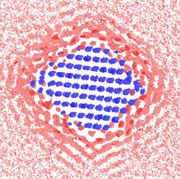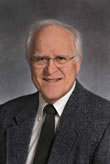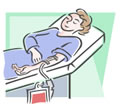


The biggest environmental challenges facing scientists today will require a better understanding of nanosized minerals, which abide by their own often mysterious rules. Scientists at the recently created Berkeley Nanogeoscience Center at Berkeley Lab are working to learn these rules. Using computer simulations, they have developed the first predicted images of water molecules surrounding a nanoparticle, in this case an iron-oxide mineral called hematite.
Cleaning up contaminants left over from abandoned mines, or learning how to store carbon underground—where it can’t contribute to climate change—will require a better understanding of how nanosized minerals participate in these processes. Addressing these headline-grabbing problems is one of the reasons behind the Berkeley Nanogeoscience Center, which seeks to uncover the roles played by nanosized particles in geochemical processes —both manmade and natural. The multidisciplinary group of scientists utilizes cutting-edge imaging technologies and computer simulations to learn what makes nanosized minerals tick. More>
 Jan Liphardt of the Physical Biosciences Division led research that showed how thousands of bacterial membrane proteins are able to assemble into clusters that direct cell movement to select chemicals in their environment. The results provide valuable insight into how complex periodic patterns in biological systems are formed and could also provide pointers in the fabrication of nanodevices and the development of nanoelectronic circuits. More>
Jan Liphardt of the Physical Biosciences Division led research that showed how thousands of bacterial membrane proteins are able to assemble into clusters that direct cell movement to select chemicals in their environment. The results provide valuable insight into how complex periodic patterns in biological systems are formed and could also provide pointers in the fabrication of nanodevices and the development of nanoelectronic circuits. More>
 People: Robert Glaeser Selected as Microscopy Society of America Fellow
People: Robert Glaeser Selected as Microscopy Society of America FellowLife Sciences investigator Robert Glaeser has been selected as a Microscopy Society of America (MSA) Fellow. Glaeser is among a group of 43 inaugural Fellows selected in this first year of the Fellowship program. The designation of MSA Fellow is intended to recognize senior distinguished members of the Society who have made significant contributions to the advancement of the science and practice of microscopy imaging, analysis and diffraction techniques.
 Special Event: Summer Lecture Series Starts Today
Special Event: Summer Lecture Series Starts TodayThe ultrafast motion of atoms and electrons lies at the heart of chemical reactions, advanced materials with exotic properties, and biological processes such as the first event in vision. Bob Schoenlein, Deputy Director for Science at the Advanced Light Source, will discuss how such processes are revealed by using laser pulses spanning a millionth of a billionth of a second, and how a new generation of light sources will bring the penetrating power of x-rays to the world of ultrafast science. More>
 The Philanthropy Club will be hosting a blood drive in the Bloodmobile at the Cafeteria parking lot July 21, 7 a.m. to 1.pm. Click here to register for your appointment (sponsor code is LBL). Donation rules have changed recently; if you previously didn't qualify, you may now. Please stop by and check. Your blood could help save lives. First-time donors are welcome! For questions (or encouragement) call Heather Pinto x4181.
The Philanthropy Club will be hosting a blood drive in the Bloodmobile at the Cafeteria parking lot July 21, 7 a.m. to 1.pm. Click here to register for your appointment (sponsor code is LBL). Donation rules have changed recently; if you previously didn't qualify, you may now. Please stop by and check. Your blood could help save lives. First-time donors are welcome! For questions (or encouragement) call Heather Pinto x4181.
 EETD: Quarterly Newsletter Resumes Publication
EETD: Quarterly Newsletter Resumes PublicationThe EETD News, the newsletter of the Environmental Energies Technology Division, has resumed publication after a hiatus of a couple of years. It is a quarterly publication about EETD research aimed at external audiences, including academic colleagues, people in the utilities industry and building design and construction industry, policy makers and anyone interested in energy and energy efficiency. More>
 Site Access: Return Employee/Guest Badges
Site Access: Return Employee/Guest BadgesBerkeley Lab ID badges must be returned when an employee terminates employment or a guest appointment ends. Employees must return their badge, parking permit, keys, dosimetry badges, etc., at their exit interview. Guests must submit their badges and parking permits to their supervisor or host, divisional or HR contact, the Site Access Office (Bldg. 65A), or a badge return box, located near the Bldg. 65 bus stop, the ALS reception area, or Bldg. 62/66. New boxes have been installed at the Molecular Foundry (Bldg. 67), NCEM (Bldg. 72), and the Bldg. 90 lobby. Guests who have already left the Lab can mail their badges. Failure to return badges jeopardizes future access. Call x4855 for more information.
Today at Berkeley Lab is produced by Public Affairs' Communications Department